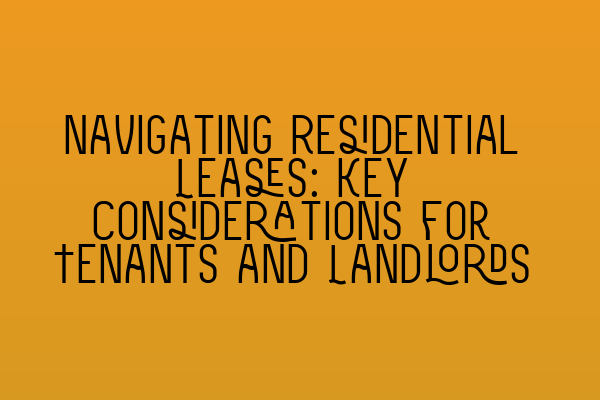Navigating Residential Leases: Key Considerations for Tenants and Landlords
Introduction
Residential leases play a vital role in the rental market, setting the terms and conditions under which landlords lease their properties to tenants. Whether you are a tenant or a landlord, understanding the key considerations involved in residential leases is crucial to ensure a smooth and mutually beneficial relationship. In this blog post, we will explore the essential factors that tenants and landlords need to navigate when entering into a residential lease agreement.
1. Duration and Renewal
The duration of the lease is a fundamental aspect to consider. Residential leases typically have a fixed term, usually ranging from six months to a year. However, some leases may have shorter or longer terms depending on the agreement between the parties involved. Landlords should clearly specify the duration in the lease agreement to avoid any confusion or disputes.
At the end of the lease term, there may be options for renewal. It is essential for tenants and landlords to discuss renewal terms in advance to ensure both parties are satisfied. Landlords should prepare appropriate documentation to extend the lease if required. If a tenant intends to vacate the property, proper notice should be given as per the terms of the lease agreement.
2. Rent and Deposit
Rent and deposit are critical components of a residential lease. Landlords should clearly state the monthly rent and payment due dates. Tenants should carefully review the rent amount and ensure it aligns with their budget.
In addition to rent, landlords usually require tenants to pay a security deposit. This deposit serves as a safeguard against potential damages or unpaid rent. The deposit amount and terms for its return should be specified in the lease agreement. Tenants should always document the condition of the property at move-in and keep records to support any claims for the return of their deposit.
3. Maintenance and Repairs
Both tenants and landlords should have a clear understanding of their responsibilities regarding maintenance and repairs. Landlords are generally responsible for maintaining the structural integrity of the property, ensuring essential systems (such as plumbing and heating) are in good working condition. Tenants, on the other hand, are responsible for keeping the property clean and reporting any maintenance issues in a timely manner.
The lease agreement should outline each party’s responsibilities in detail. Tenants should be aware of the procedure for submitting repair requests and understand the landlord’s obligation to address them promptly. Landlords, in turn, should document any repairs they conduct and maintain a record of communication with tenants.
4. Restrictions and Permitted Use
Certain restrictions and permitted uses may apply to residential leases. Landlords may impose restrictions on activities such as subletting, pets, or alterations to the property. Tenants should carefully review these restrictions to ensure they align with their lifestyle and needs.
For landlords, it is crucial to clearly state any limitations and restrictions in the lease agreement to avoid potential disputes. Tenants should seek clarification on any terms they find ambiguous or restrictive.
5. Termination and Eviction
Termination and eviction are unfortunate but sometimes necessary aspects of residential leases. Both landlords and tenants should be aware of the consequences of early termination or non-compliance with lease terms.
The lease agreement should outline the process for termination and eviction, including notice periods and any potential penalties. Landlords should familiarize themselves with relevant laws and regulations governing eviction procedures to ensure compliance.
Conclusion
Navigating residential leases requires a careful understanding of the key considerations involved. By paying attention to details such as duration, rent, maintenance, restrictions, and termination, both tenants and landlords can foster a transparent and productive relationship. If you require further assistance or have specific questions related to residential leases, do not hesitate to consult a qualified property law solicitor.
Related Articles:
– Misrepresentation in Contracts: Unveiling Deceptive Practices
– A Closer Look at SQE Contract Law Syllabus
– SQE Contract Law: Analyzing Landmark Cases and Influential Judicial Decisions
– Understanding Contractual Capacity: Rights and Limitations
– Interactive SQE Mock Tests for Contract Law: Test Your Knowledge
